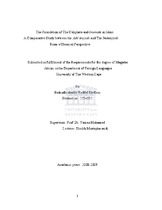The foundation of the Caliphate and Imamate in Islam: a comparative study between the Ash‛ariyyah and the Imāmiyyah from a classical perspective
Abstract
Imāmah, (imamate) literary means leading, and khilāfah (succession) means
representative. but, in the terms of "Islamic concept", the medieval theologian
and jurists has termed it «Religious–Political leadership».1 the major dispute
concerning the imamate surrounding the question of investiture to exercise the
prophet’s comprehensive authority (Wilāyah‘āmah), as the temporal and spiritual
leader of the ummah (community). From demising of the prophet, the matter of imamate, between Ash‛arī and Shī‘ah (twelve) there are two main opinions. Ash‛arī’s views are prevalent among the early Muslims headed by Abûbakar and his associates regarded the imamate to be right of the ummah (nation), and they chose Abûbakar. The Shī‘ah implicitly rejected the previous opinion, and maintained that the leadership was passed on through a special designation. This regarded the imamate divinely
invested in ‘Ali ibn Abī Ţālib, the prophet cousin and son-in-law. Therefore,
controversy between Ash‛arī and Shī‘ah on the question of leadership arise after
the prophet returns and coherences to the two fundamentals central points:
First: The nature of the relationship of the prophethood to the political leadership.
The Shī‘ah regarded political leadership as an extension of the prophetic mission
after the demise of the prophet: «Meaning that political leadership is not simply
political rule but it is the corollary of the interpretation of religion, and takes
imamate in depth interpretation»2. Other hands, Ash‛arī consider and include it in
the matter of masāliħ Al ‛āmah (public interest). The Islamic jurists definite the
masāliħ al ‛āmah (public interest), any issue whether it is religion or matter of world that could not fixed with fact proof from holy Qur'ān and prophet’s
tradition. Therefore, the matter of caliphate emerges it in the masāliħ al-‛āmah
(public interest) which, relies on human agency. Second: The contract of political leadership and authority between the problematic of mutual consultation and divine appointment. This point focus on ‘aqd (contract) of khilāfah (repress- entative of God) between leader and ummah (nation) and evolves around the problem of consultation, mainly in the Ash‛arī’s view, which is based on "selection system". So, in the historical experience, it can be noted that the consultation as mechanism in the choosing the ruler was not achieved as an "organized system" neither in the period of the rightly guided caliphs, nor in the periods of dynastic rulers. The imamate as a «supreme
leadership» had a major problem issue in the contemporary scholars, both the
Islamic and secular, since it was announced in the modern context Dawlah
(government), which based on nationality and separated from religious
hegemony. Its dialectic, in the present article, is to deal with theological and
judicial theory. Therefore, in 1979, the Islamic council of Europe published a
«concept of Islamic state». Most of the figures shaded are based on the
Khomeini's thought (the founder of Islamic republic revolution of Iran), and
Karāchī’s Muslim council scholar (they constituted Ash‛arī view). In the Islamic
state, the Khomeini thought based on «the Islamic state is constitutional;
Government is based on law and the Paramount legislative authority resides on
God himself». On the other hand,«the Islamic state» shaped as «the principals of
an Islamic state which centers on the supremacy of God, citizens rights and
proper government» 3 Therefore, caliphate it is difficult to separate or detach from prophethood in the perspective of the commentary and interpretation of equally the Qur'anic and Sunna texts. So, difference between Ash‛arī and Shī‘ah around immāmah
(leadership in Islam) are based on the theological principles which rise from the
problem of cosmology, divine justice and human destiny. Therefore, the difference can be based on the idea (thought) about these theological principles.

